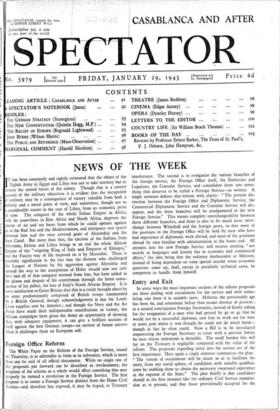Foreign Office Reform
The White Paper on the Reform of the Foreign Service, issued on Thursday, is as admirable in form as in substance, which is more than can be said of all official documents. While no single one of the proposals put forward can be described as revolutionary, the adoption of the scheme as a whole would effect something that may properly be termed a revolution in the Foreign Service. The first Purpose is to create a Foreign Service distinct from the Home Civil Service—and therefore less exposed, it may be hoped, to Treasury
interference. The second is to reorganise the various branches of the foreign service, the Foreign Office itself, the Embassies and Legations, the Consular Service, and consolidate them into some- thing that deserves to be styled a Foreign Service—so written. A single sentence defines this-reform with clarity : " The present dis- tinction between the Foreign Office and Diplomatic Service, the Commercial Diplomatic Service and the Consular Service will dis- appear, and the three branches will be amalgamated in the new Foreign Service." This means complete interchangeability between these different branches, and there is also to be much more inter- change between Whitehall and the foreign posts, so that most of the positions in the Foreign Office will be held by men who have had experience of diplomatic work abroad, and most of the positions abroad by men familiar with administration at the home end. All entrants into the new Foreign Service will receive training " not merely in languages and history but in economic and commercial affairs," the idea being that the ordinary Ambassador or Minister, instead of being dependent on some special attaché when economic questions come up, shall, except in peculiarly technical cases, be competent to handle theni himself.


























